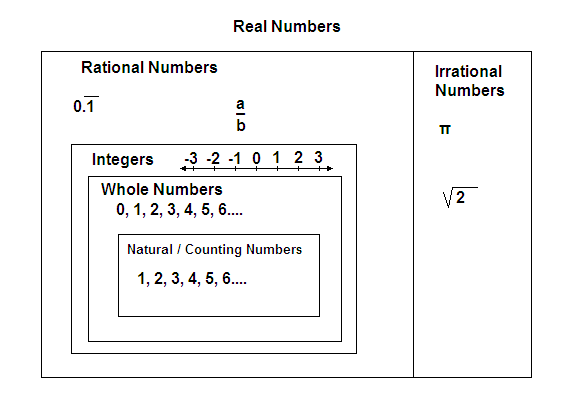The Number System
The Number System
[edit | edit source]The number system is the way we categorize numbers. There may be an infinite amount of them, but they all fall nicely into several ranges.
Except for the last one, all of these groups, or sets, are cascading inclusive: the first group is part of the second, which is part of the third, which is part of the fourth, and the pattern continues.
Natural Numbers
[edit | edit source]Natural numbers (also called counting numbers) can be formed by repeated addition of the number 1.
1, 2, 3, 4, 5, 6, 7... and so on
By most definitions, 0 is a natural number representing no value.
Whole Numbers
[edit | edit source]The group of whole numbers is another name for the natural numbers but always includes 0:
0, 1, 2, 3, 4, 5...
Integers
[edit | edit source]Integers include all whole numbers but also extend infinitely into the negative numbers. Except for zero (which is neither positive nor negative), all integers are assumed to be positive if they do not have a negative sign (-) marking them negative.
...-4, -3, -2, -1, 0, 1, 2, 3, 4, 5....
Rational Numbers
[edit | edit source]Rational numbers are any number that can be represented by , where a and b are any integer and b does not equal zero.
This includes fractions such as and whole numbers (The whole number 32 can be represented as ). Many decimals are rational numbers, too, even non-terminating repeating ones such as 0.333... and 0.412412412.... 0.333... can be expressed as or (try dividing 3 into 9, and you'll see why). 0.412412412... can be expressed as
Irrational Numbers
[edit | edit source]This group is completely exclusive from all the aforementioned groups. It is its own group. Irrational numbers are any number which can not be written as the quotient (division) of two integers, which means it can't be represented by forms, numbers such as pi, equal to 3.14159... (with no terminating digit). The square root of any whole number other than the square of an integer (0, 1, 4, 9, 16 ...) is irrational. Irrational numbers have non-repeating decimal expansions. Any number which is a repeating decimal is rational.







